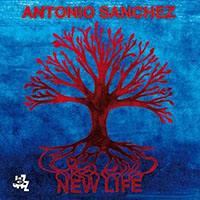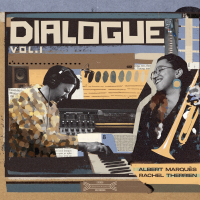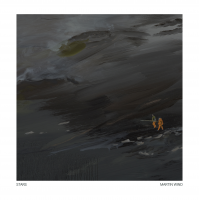Home » Jazz Articles » Extended Analysis » Antonio Sanchez: New Life
Antonio Sanchez: New Life
Neither of those recordings—good as they are—are suitable preparation for New Life, where Sanchez takes a quantum leap forward as his compositional, conceptual and bandleading skills catch up with his playing. Sanchez hasn't just been working with Metheny in the past decade; his résumé has seen him in a multitude of contexts, ranging from saxophonists David Sanchez and Miguel Zenon, and trumpeters Alex Sipiagin and Diego Urcola, to singers Diane Reeves and Jane Monheit, and pianists Enrico Pieranunzi and Kenny Werner. Such experience would suggest a growing eclecticism, but while New Life is, indeed, Sanchez's most far-reaching recording, it's also one that, like his previous two, has a distinct identity, in this case in the broader context of his best group yet, a hard-hitting quintet occasionally augmented with singer Thana Alexa's wordless vocals.
Sanchez has also been one of Donny McCaslin's first-calls, appearing on a string of four recordings with the tenor saxophonist starting with Soar (Sunnyside, 2006), so it's no surprise to see McCaslin return the favor here, delivering the kind of unfettered yet still somehow in-control power that's become a personal signature. What makes New Life even more special is Sanchez's enlisting of David Binney. A fixture on the New York scene and a significant compositional/production influence who also happens to be an even stronger and more inventive player when freed from those roles to just play, the alto saxophonist collaborated with McCaslin in the '90s quartet Lan Xang, and the pair have since found themselves together on various projects for good reason: beyond Sanchez's own ability to blend frenetic potency with paradoxically ferocious delicacy, Binney and McCaslin's uncanny chemistry—whether playing unison, harmony or counterpoint that often orbits but occasionally intersects—represents a big part of New Life's drive.
Pianist John Escreet, a relative up-and-comer who has been a part of Binney's circle since his own Don't Fight the Inevitable (2010), on the altoist's Mythology label, continues to prove an increasingly acute and intuitive player regardless of context—and whether he's on acoustic piano or Fender Rhodes—making him an ideal addition to the group. Bassist Matt Brewer has a preexisting musical relationship with Escreet and, beyond that, a similar breadth of reach, ranging from saxophonist Rudresh Mahanthappa to trombonist Ryan Keberle, that makes him another ideal partner. With a band like this, how could Sanchez fail?
Well, if folks want to use coined phrases like "this group could play the phone book and make it sound good," that may be true except that, just like a good actor with a good script versus a bad one—where it might still be possible to recognize his/her talent but it doesn't make the movie any good—that's where Sanchez's growth as a writer comes in. There's a myriad of touchstones to be found here, to be sure. The modal opener, "Uprisings and Revolutions," suggests how saxophonist John Coltrane might sound, were he a young firebrand emerging today, but this is far from direct imitation; instead, with Brewer anchoring and Sanchez driving with a perfect blend of freedom and finesse, Escreet's accompaniment behind incendiary solos from both saxophonists may, indeed, have roots in Coltrane-era McCoy Tyner, but with a density less based on blocky muscularity and more on the pianist's use of expanded modernist harmony, Escreet's support drives the tune towards Sanchez's ostinato-based solo, one as heated as anything that's come before.
The alternating sections of "Minotauro" create a constantly shifting sense of tension and release throughout, from irregular to regular meter, with Escreet's ethereal Fender Rhodes creating more delicate support to the horns—two lines that, at times chase each other, elsewhere operate in unison and, finally, spread out into broader harmony. Escreet takes an initially dark-hued solo that opens up when the meter shifts to 6/8, gradually building in intensity before leading to another ostinato-driven solo from Sanchez that plays liberally with time, even as it builds to its own thunderous peak.
The title track's breezy Brazilian vibe, arpeggio-driven piano lines and wordless vocals feel, at first, like something that would be comfortable in the Metheny Group songbook but, like so much of New Life, it's a ruse as it unfolds into a propulsive middle section that sets up one of McCaslin's finest solos, the tenorist moving from innate lyricism to searing lines of near-light speed. If Sanchez has learned anything from Metheny compositionally, it's how to think on a more expansive scale and build towards a climax bigger than the sum of its two individual parts, now harmoniously brought together.
There are hints of gospel in the gentler ballad of "Nighttime Story," while Alexa's ability to sing Sanchez's knotty, serpentine melody on the driving "Medusa" suggests a rising star worthy of real attention. "The Real McDaddy" is a piece of idiosyncratic funk that, after an opening trio of Binney, McCaslin and Sanchez, turns quirkier still, with thematic stops and starts and metric shifts that set up a different trio—Escreet, Brewer and Sanchez—where the pianist (on Rhodes) manages to connect the dots with a combination of cerebral dexterity and the occasional touch of grease. "Air" is a lyrical ballad that seems like a feature for McCaslin on soprano, despite not being credited as such on the date, while the set closes with another cinematic epic in "Family Ties."
With so much going for it, it's hard to imagine New Life not showing up on plenty of "best of year" lists, even though it's still early days for 2013. With New Life, Sanchez the composer and bandleader has caught up with Sanchez the player, and if he's learned another thing from his tenure with Metheny it's how to write tunes that are compelling and downright accessible, despite being unequivocally challenging under the hood. With his group hitting the road for a month of touring in support of New Life, Sanchez has reached a new stage in his career. If he remains in demand with artists like Metheny—whose Unity Group is gearing up for a recording and major tour—hopefully he'll still be able to carve time out for himself in his busy schedule. With material this strong and a band this capable, Sanchez is ready to focus more time on being a leader, because clearly it's paying big dividends.
Track Listing
Uprisings and Revolutions; Minotauro; New Life; Nighttime Story; Medusa; The Real McDaddy; Air; Family Ties.
Personnel
Antonio Sanchez
drumsAntonio Sanchez: drums, vocals, additional keyboards; Dave Binney: alto saxophone; Donny McCaslin: tenor saxophone; John Escreet: piano, Fender Rhodes; Matt Brewer: acoustic and electric bass; Thana Alexa: voice.
Album information
Title: New Life | Year Released: 2013 | Record Label: CAM Jazz
Tags
PREVIOUS / NEXT
Antonio Sanchez Concerts
Support All About Jazz
 All About Jazz has been a pillar of jazz since 1995, championing it as an art form and, more importantly, supporting the musicians who make it. Our enduring commitment has made "AAJ" one of the most culturally important websites of its kind, read by hundreds of thousands of fans, musicians and industry figures every month.
All About Jazz has been a pillar of jazz since 1995, championing it as an art form and, more importantly, supporting the musicians who make it. Our enduring commitment has made "AAJ" one of the most culturally important websites of its kind, read by hundreds of thousands of fans, musicians and industry figures every month.






















